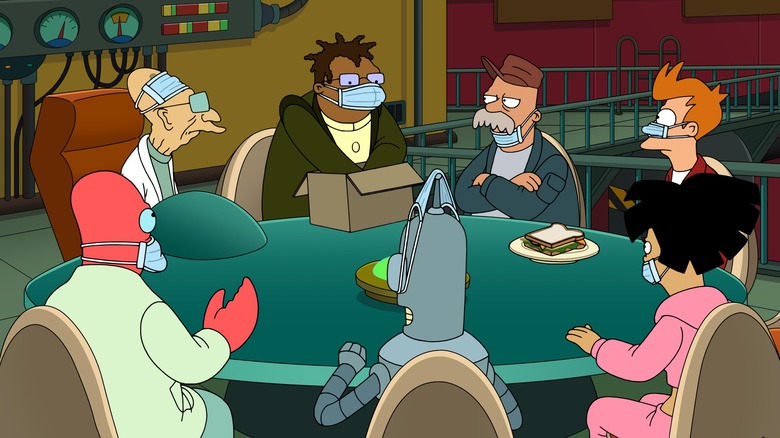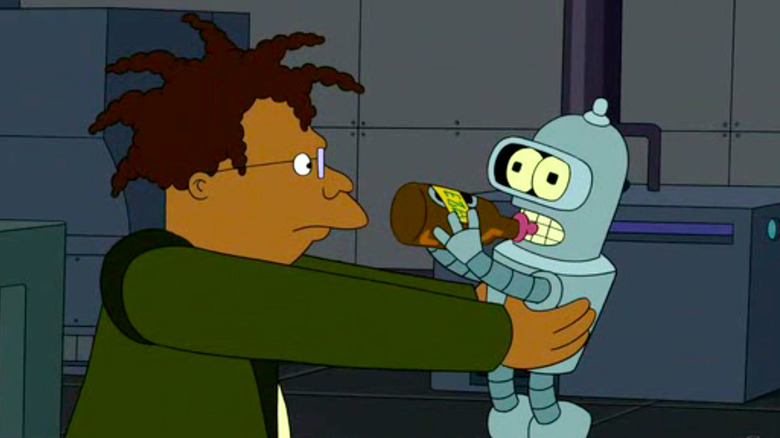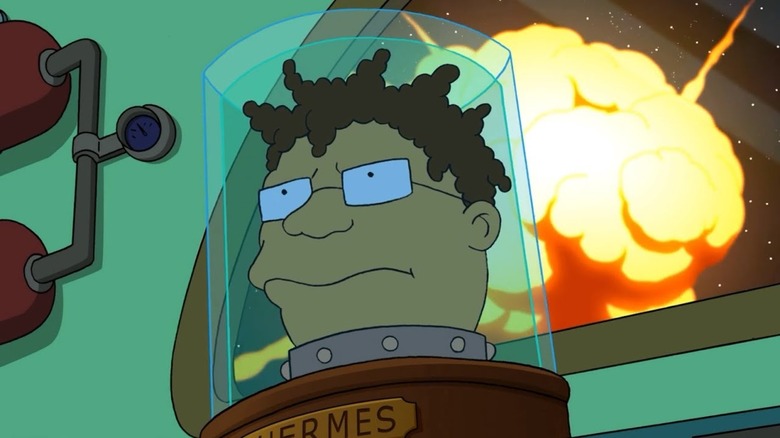Futurama Season 11 Offers A Rarity: A Hermes-Centric Episode
Although those early seasons of "Futurama" were probably its strongest overall, one of the show's flaws was the way that minor characters didn't receive enough focus. The first two seasons were very much the Fry, Bender, and Leela show; Professor Farnsworth got plenty of attention too, but the other members of the crew were frequently kept on the sidelines. Amy was mostly there to obliviously make comments that Leela finds insulting, Kif was there to be target of Zapp's abuse, and Hermes was just the casually cold bureaucrat who was great at the limbo.
All of these characters were fleshed out a lot over the series; it wasn't necessarily because the show shifted its focus more towards them, but because after 140 episodes or so, those bits of time we got with them started to add up. It also helps that each season tends to give these minor characters one or two spotlight episodes, like when Kif finally got to win Amy's love in season 3's "Amazon Women in the Mood," or when Amy earns her PhD in season 7's "That Darn Katz!"
For Hermes, it wasn't until season 2's "How Hermes Requisitioned His Groove Back" that the show focused on him for an episode, but even then it wasn't really focusing on him. The whole middle act centers on Hermes being replaced by a female bureaucrat who has a strange affair with Fry; Hermes still gets to save the day, but the storyline's wrapped up mainly through a whole bunch of jokes about how absurdly inefficient and complicated bureaucracy can be. It's a funny episode, quite possibly one of the best of its season, but it didn't exactly turn Hermes into a three-dimensional character.
A man who does more than just limbo
As the show goes on, we learned more about Hermes. He's got a strained relationship with his apathetic son Dwight, and his wife LaBarbara is loving but also perfectly happy to return to her ex-husband Barbados Slim at the tiniest inconvenience. It seems cruel for LaBarbara to so quickly leave Hermes for Barbados, and even crueler for her to repeatedly remark on how much more handsome and better in bed Barbados is, but she does so with a surprising straightforwardness and lack of venom that makes it hard to hold it against her.
As much as we'd come to love Hermes throughout the original run of "Futurama," it wasn't really until season 7's "Lethal Inspection" that he started to feel like a character with some actual depth. That was the episode where Bender discovered he's not immortal like he always thought he was, so he takes Hermes with him to Mexico so he can beat up the bureaucrat who poorly inspected him as a robot baby. Bender never finds the inspector, but the ending reveals it was Hermes. Hermes had realized baby Bender had a defective back-up unit, but he couldn't bring himself to let Bender be scrapped for parts with the rest of the defective robots. Hermes chose to lie about the back-up unit, knowing that it would allow Bender to grow up and live a full life, even if he couldn't live that life forever.
Hermes is famous for his cold adherence to bureaucracy, so his decision to ignore the rules for baby Bender's sake is genuinely moving. Yes, Bender grew up to be a total monster, but that's beside the point. We'd never before seen this tender side of Hermes.
Futurama season 11's Hermes episode
"Futurama" season 11's "Rage Against the Vaccine" is all about COVID-19, taking the pandemic-related conflicts and conspiracy theories of the past three years and throwing them into a single episode. Considering how much COVID intensified Americans' already-strong dislike of bureaucracy, it's no surprise that this turned out to be a Hermes-centric story. Much like the limbo episode in season 5, however, this is a Hermes-centric episode that's fascinating mainly because of how well it takes him out of the usual bureaucratic role. Hermes isn't interested in solving this new cranky pandemic through public policy, but through Voodoo.
Hermes takes a perilous trip to New New Orleans and just barely makes it to the Voodoo HQ, which is led by none other than Barbados Slim. (Poor Hermes, he can never quite escape the fact that his mortal enemy/wife's lover is around every corner.) Barbados reveals that he was taught in the ways of Voodoo by none other than LaBarbara, who shows up in the room soon afterward. "I couldn't let you do this alone," she says to Hermes, in a sweet moment. Sure, their loving embrace is sandwiched between several jokes about LaBarbara and Barbados sorta kinda definitely having an affair, but no need to unpack any of that now.
The trio puts aside their differences to find a cure for the virus, inventing a type of "Voodoo potion" that's basically indistinguishable from a regular vaccine. It's the perfect solution for a world where a significant portion of the population distrusts regular scientists to the point where they'd rather try to cure themselves through ivermectin or some questionable herbal treatment. The citizens who trust modern medicine can have Farnsworth's vaccine; the citizens who distrust it can instead opt for ... also the vaccine, but with a different name.
How does 'Rage Against the Vaccine' compare to past Hermes' episodes?
Unfortunately, this episode probably won't go down in the show's history as one of Hermes' best. Not only was the storyline itself a little too played out (it was basically just a collage of COVID-19 jokes that had already been done to death back in 2020) but it didn't really show us anything new about Hermes. Whereas "Bender's Big Score" ended with Hermes proving himself a badass as he leads a space battalion and wins back his wife, and "Lethal Inspection" shows us the softer, more compassionate side of his character, this episode just gives Hermes a mild win. Farnsworth's apology is nice, but it isn't quite cathartic enough to make up for the all the disrespect aimed at Hermes throughout the episode — not just from his wife but also from all his fellow crew members at the Planet Express.
Still, considering that Hermes once spent an entire episode possessed by a brain slug with no one bothering to save him, and the writers even played around with the idea of having him stay possessed by that slug long-term, this latest installment still serves to show how much kinder the show's gotten towards its more secondary characters. Back in season 2 or 3, an episode like this would've been a big deal for Hermes, but by now he's grown so familiar that this is no longer remarkable. "Rage Against the Vaccine" might not have been Hermes' best episode, but it's a nice display of how far he's come.



